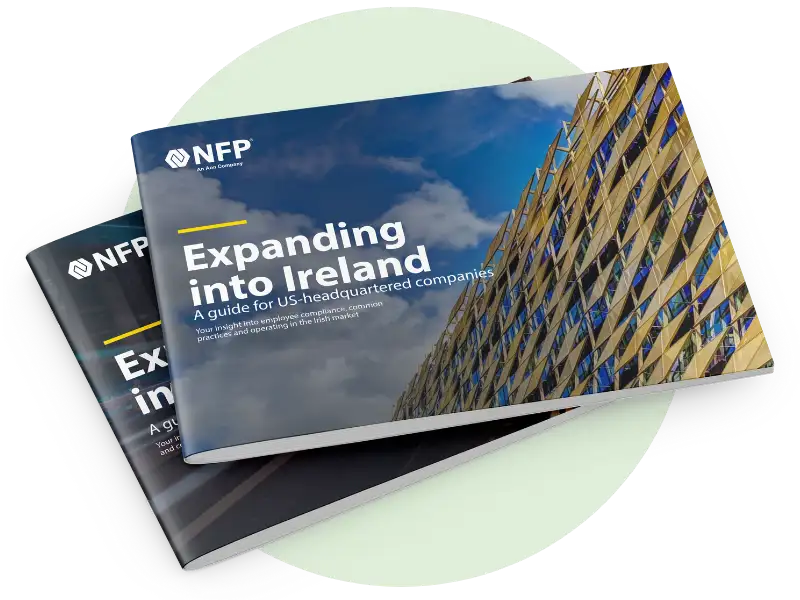Thanks to the low corporate tax rate, highly skilled workforce, and easy access to other European markets that it offers, Ireland has become a popular destination choice for many global businesses looking to expand into new territories¹. However, while it can be easy to focus on the benefits, Ireland has key legal and cultural differences that, if not considered, could put the success of your expansion at risk.
In this article in our Expanding to Ireland series, our Head of Employee Benefits in Ireland, Brian McKiernan, walks you through these key considerations and how to navigate them, helping you make your employee benefits strategy a success and deliver value to your people in Ireland.
Key takeaways
- Learn the key differences that your employee benefits strategy should accommodate for in Ireland
- Understand which benefits are required by law and which ones can help you stand out as an employer of choice in Ireland
- Discover how you can engage your people in Ireland with the great benefits you offer
An exciting step
Expanding overseas is an exciting step for your business, and if Ireland is your destination of choice, then you’d be joining some of the world’s largest organisations that have chosen the Emerald Isle as one of their homes. In our bid to helping ensure your expansion is a success, it’s crucial that we let business like yours know that, among all the great benefits of operating in Ireland, there are a number of legal and cultural differences between Ireland and the US that could mean your current strategy will need to be tweaked in order to deliver success in Ireland.
Below are 5 important employee benefits differences and considerations that your business should take into account, in order to help you design a strategy that delivers value to your organisation and your people in Ireland.
1. Budgeting
The healthcare system in the US is such that the majority of your employee benefits budget will be allocated to providing comprehensive medical insurance. In Ireland, the public healthcare system, run by the Health Service Executive (HSE) and funded by general taxation, means that this will not be the case.
The main element of an Irish business’ employee benefits strategy (the one with the highest cost and which is generally regarded by Irish employees as the most important) is retirement plans, typically by way of a Workplace Pension Plan, also known as an Occupational Pension Scheme.
2. Pensions and retirement
A pension is the benefit you need to ensure you get right - from both a compliance and benchmarking perspective - to be able to attract and retain the best talent; not only should you provide the right product and contribution structure, but your people in Ireland will expect to have assisted advice around how their pension works and the investment strategy.
There are two types of pension structure in Ireland:
- The Occupational Pension Scheme “OPS”: established by an employer under trust, with the employer or a third party typically acting as the trustee.
- Personal Retirement Savings Account scheme “PRSA”: each employee has a personal pension account, and a trust is not required.
Auto-enrolment
The auto-enrolment scheme is set to come into effect in Ireland in 2025, and legally requires employers to automatically enrol eligible employees into a pension scheme, which will help promote financial security and independence.
Supporting the transition to retirement
While there is no legal requirement for you to do so, offering retirement support to your people through what can be a daunting transition is a great way to stand out as an employer of choice. With the right guidance, you can help your people in Ireland:
- Save enough money to have the future they want for them and their family
- Understand complex financial topics, like wills, inheritance, and pension tax
- Be confident that they’re prepared for a life after work
3. Staple benefits in Ireland
There are certain employee benefits that we class as essential, either because they’re mandated by law in Ireland or because Irish people have come to expect them from their employer.
Required by law
The minimum expectation as an employer setting up in Ireland is that you offer your people the benefits required by local law. Examples of mandatory benefits in Ireland, include:
- Annual leave (vacation) entitlements
- Statutory sick pay if an employee is unable to work due to ill health
- A workplace pension plan to help your people save for retirement (auto-enrolment coming in 2025, see above)
Expected by employees in Ireland
While not required by law, we advise at least offering the benefits that are expected by people in Ireland in your sector – ones that your competitors could also be offering. These benefits include:
- Private medical insurance (PMI)
- Income protection benefits (also known as Long Term Disability)
- Employer-funded life insurance and critical illness
- Enhanced maternity and paternity leave
4. Benefits to help you stand out in Ireland
When thinking about the benefits that can help you truly stand out, put yourself in the shoes of the people you’re trying to attract and retain. How can your benefits really support them in their daily lives? What incentives will help them find more value in a role at your company over a similar role with a competitor?
- Some employers in Ireland are offering standout benefits such as:
- Meal vouchers for free or subsidised lunches
- Enhanced maternity and paternity leave
- Generous family-forming benefits to support those having children
- Training and qualification support
5. Communication of your benefits
A key component of a successful employee benefits strategy in Ireland is how you communicate your benefits and drive engagement among your people. Methods like digital platforms and educational seminars can encourage your people to take advantage of the great benefits you offer and make them more accessible, which can:
- Empower your people to bring their best mental and physical selves to work
- Lead to a better return on your benefits investment
- Remind your people that they’re valued by your business
Expanding into Ireland: a guide for US-headquartered companies
On the surface it may appear that the US and Ireland may have many similarities, however, if you assume that your business operations in both countries will look the same, your success may be less likely. That’s why our specialists in Ireland wrote this guide to act as your insight into employee compliance, common practices and operating in the Irish market.
By exploring the fundamental areas of employee benefits, HR and people, health and safety, and insurance, this guide will:
- Help you understand and navigate the main Irish employment laws
- Outline how your Irish and US operations will need to differ for your employees
- Show you how to compete and be a leader in your sector in Ireland


Author
Brian McKiernan, Head of Employee Benefits
Brian is a Qualified Financial Adviser (QFA) with 22+ years experience in the Financial Services arena, helping multi-sectoral corporate clients (Irish, regional and global) optimise their spend on benefits and enhancing their employee engagement and experience in their corporate pension and employee benefits programs.